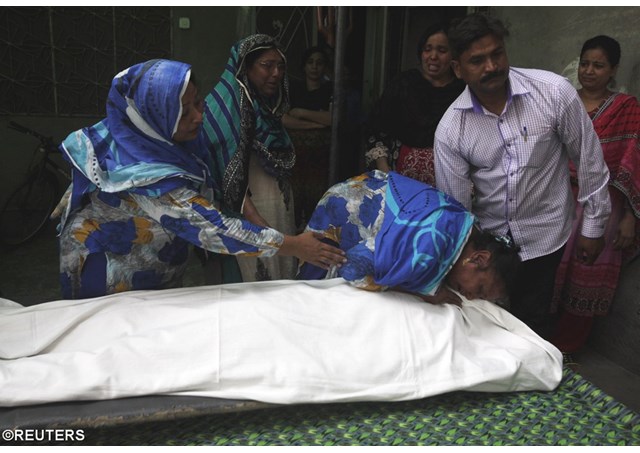
Pakistan executes Christian death row inmate

(Vatican Radio) Pakistan on Wednesday executed a Christian death row convict despite repeated calls for clemency from rights groups and Church leaders. A spokesman for Justice Project Pakistan (JPP), a law firm specializing in death row cases, confirmed that Aftab Bahadur Masih was hanged at Kot Lakhpat Jail in the eastern city of Lahore in the early hours of Wednesday.
Bahadur was arrested in 1992 in a case involving the murder of a woman, Sabiha Bari and her two sons. He was tried and convicted in a speedy trial. Critics say the verdict was based on tainted evidence and forced confessions, and witnesses in the case now say Bahadur is innocent.
Bahadur was only 15 years old at the time of his arrest — too young to face the death penalty, argued critics including the Justice Project Pakistan (JPP), a legal rights organisation representing Bahadur, and British rights group Reprieve.
They also argue he was tortured into confessing to the crimes, as were two of the witnesses against him, who have both since retracted their statements. One witness and co-accused in the crime, Ghulam Mustafa, a plumber with whom Aftab worked as a plumber's apprentice, was arrested early in the morning of 6th September 1992, and the police reportedly used torture to force him to implicate Aftab.
Ghulam has recently stated that Aftab had nothing to do with the crime, for which there was only one other eyewitness. He has also made a statement before a religious figure saying he lied, and that he was not even there and did not see Aftab commit the crime.
Ghulam Mustafa, the co-accused who also maintains his innocence was not hanged as scheduled on Wednesday, after reportedly reaching a settlement with the victim's family.
"This is a truly shameful day for Pakistan's justice system," Maya Foa, director of Reprieve's death penalty team, said in a statement. "Aftab was subjected to almost every injustice conceivable. Just 15 years old when he was arrested, tortured and sentenced to death, he spent 23 years languishing on death row for a crime he didn’t commit before being executed in the early hours of this morning," she said in a statement.
"To the last, Pakistan refused even to grant his lawyers the few days needed to present evidence which would have proved his innocence. This is a travesty of justice and (a) tragedy for all those who knew Aftab."
On Tuesday, jail authorities defied a Lahore High Court order that allowed JPP access to Mustafa, the co-accused, in order to obtain a signed affidavit of him declaring Bahadur's innocence, JPP lawyers told Al Jazeera.
Earlier, Pakistani authorities granted a fourth last-minute stay of execution to Shafqat Hussain, due to be hanged on Tuesday, who rights groups also claim was a minor who was tortured into confessing to a murder in 2004.
"Dual punishment of a single crime"
Speaking to Al Jazeera in February, Bahadur had said he felt it was "unjust" for him to have been imprisoned for such a duration.
"I have spent 23 years in jail and it is more painful than a life sentence. I feel this is unfair and unjust to keep us in such a situation that we are forced to bear dual punishment of a single crime," he said.
"During the last 23 years of my imprisonment, I have received death warrants so many times that I can't remember the exact number.
"Obviously, it feels horrible whenever the warrant had been issued. We start to count down [to our execution] which itself is painful and shackles our nerves," Bahadur told Al Jazeera at the time.
"In fact, we die many times before our death. In my personal experience, nothing is more dreadful that waiting to die."
Bahadur, who was a Christian, said that he and fellow non-Muslim inmates at Kot Lakhpat Jail faced threats from other prisoners based on their faith.
Protests
Dozens of activists and relatives of Bahadur held a protest on Tuesday outside the Lahore press club demanding the execution be stopped, while Church leaders had also appealed to the president for a reprieve.
“It is unfortunate that authorities have gone ahead with the execution of Aftab Bahadur,” Cecil Chaudhry, executive director of the National Commission of Justice and Peace, a human rights body of the Catholic Church, told ucanews.com on Wednesday.
“Justice demands that if there is an iota of doubt, there should be an inquiry. In the Aftab Bahadur case, there was strong evidence to suggest that he was a juvenile at the time of his conviction,” Chaudhry said. “Two witnesses also retracted their statements and said Aftab was innocent.”
Chaudhry said that President Mamnoon Hussain could have considered the fact that Bahadur had already spent 23 years behind bars. Before the execution, the NCJP had pleaded with President Hussain to grant clemency. The Archbishop of Karachi, Joseph Coutts, had also written to the president, asking for the execution to be stopped.
Pakistan lifted a six-year moratorium on executions in December after the massacre of 132 children at a military-run school in Peshawar.
Last week, Pakistan’s independent human rights commission said that more than 130 people have been executed in 2015, the highest for any year in a decade.
The commission has demanded the government re-impose the moratorium on capital punishment and abolish the death penalty.
(Source: Ucan, Al Jazeera, AFP)
| All the contents on this site are copyrighted ©. |


